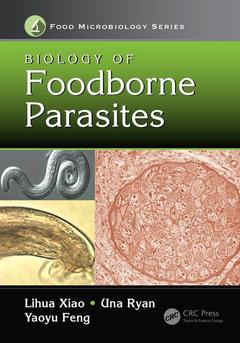Biology of Foodborne Parasites Food Microbiology Series
Coordonnateurs : Xiao Lihua, Ryan Una, Feng Yaoyu

While a number of introductory books on basic and molecular biology are available, none highlight the foodborne parasitic pathogens. Until now. A state-of-the-art review, Biology of Foodborne Parasites charts significant progress and outlines key biological techniques applied to foodborne parasitic pathogens research. The book covers basic biology, genetics and genomics, epidemiology, pathogenesis, diagnosis, control, and prevention. It showcases recent research that can then be used to spark further breakthroughs.
The book addresses challenging issues in food pathogen detection. It details individual foodborne protists and helminthes, with each chapter following a similar format for a consistent presentation of information. It discusses topics ranging from basic biology, genetics and genomics, molecular detection and typing, and pathogenesis to epidemiology, molecular epidemiology, treatment and prevention, among other current concerns. It also details the methods used to diagnose the infection, characterize the pathogen, and detect parasites in three food commodities: meats, water, and fresh produce.
With chapters written by experts in their respective fields, the book presents a reliable roadmap for future development of improved, innovative biological and molecular methods for analysis of foodborne parasitic pathogens. A handy, comprehensive reference on all aspects of biology of foodborne parasites, it highlights research needs and directions, helping you develop advanced diagnostic tools and new intervention measures.
Section I: Key Molecular Techniques Applicable to Foodborne Parasitic Pathogens Research. Genetic manipulation. Molecular detection and identification. Molecular typing and population genetics. Phylogenetic analysis. Whole genome sequencing. Metagenomic analysis. Vaccine development. Section II: Important Foodborne Protists. Blastocystis. Cryptosporidium. Cyclospora. Cystoisospora. Entamoeba. Enterocytozoon bieneusi. Giardia. Sarcocystis. Toxoplasma. Trypanosoma cruzi. Section III: Important Foodborne Helminths. Angiostrongylus. Anisakis. Clonorchis, Opisthorchis, and Metorchis (Opisthorchiidae). Diphyllobothrium and Spirometra. Echinostoma. Fasciola and Fasciolopsis. Gnathostoma. Metagonimus. Paragonimus. Taenia. Trichinella. Index.
Lihua Xiao received his veterinary education in China and his PhD and postdoctoral training in parasitology in the United States. He joined the Centers for Disease Control and Prevention (CDC) in 1993, first as a guest researcher and then as a senior staff fellow. He is currently a senior scientist in the Division of Foodborne, Waterborne, and Environmental Diseases, National Center for Emerging and Zoonotic Infectious Diseases, CDC, Atlanta, Georgia. His earlier research interests were mostly in the immunopathogenesis of malaria and HIV. For the last 20 years, he has focused mostly on the diagnosis, molecular epidemiology, comparative genomics, and ecology of foodborne, waterborne, and zoonotic parasites and is mostly noted for his work on the genus Cryptosporidium. He has published over 300 original papers and invited reviews and book chapters, has edited several books and special publications, and is an editorial board member of several prominent journals in microbiology and parasitology. He holds adjunct faculty positions at Cornell University, Murdoch University, and East China University of Science and Technology. He was the 2012 recipient of the Henry Baldwin Ward Medal from the American Society of Parasitologists.
Una Ryan received her undergraduate degree in zoology from University College Dublin in Ireland in 1988 and her PhD in parasitology from Murdoch University in Western Australia in 1996. She worked at Murdoch University as a research fellow and became a tenured member of staff in 2001. She is currently professor in biochemistry in the School of Veterinary and Life Sciences at Murdoch University. Her research has focused on the molecular detection and characterization of waterborne and bloodborne parasites, particularly Cryptosporidium. She has published over 200 original papers and invited reviews and book chapters and is a specialist editor for Experimental Parasitology. In 2000, she was awarded the A
Date de parution : 04-2015
17.8x25.4 cm
Thème de Biology of Foodborne Parasites :
Mots-clés :
Food Safety Modernization Act; PCR RFLP Assay; foodborne parasitic pathogens; Denitive Host; IMPORTANT FOODBORNE HELMINTHS; PCR Amplication; IMPORTANT FOODBORNE PROTISTS; Didelphis Virginiana; Public Health; Opisthorchis Felineus; Molecular Biological Techniques; Intermediate Host; Rst Intermediate Host; Angiostrongylus Cantonensis; Adult Worms; Liver Uke; Ventral Sucker; Foodborne Transmission; Tissue Cysts; Foodborne Parasites; Eosinophilic Meningitis; Experimental Human Infection; ITS1 Sequence; Paratenic Hosts; Foodborne Trematodes; Lao PDR; Ta Te; Highly Active Antiretroviral Therapy; HAART; SSU rRNA



